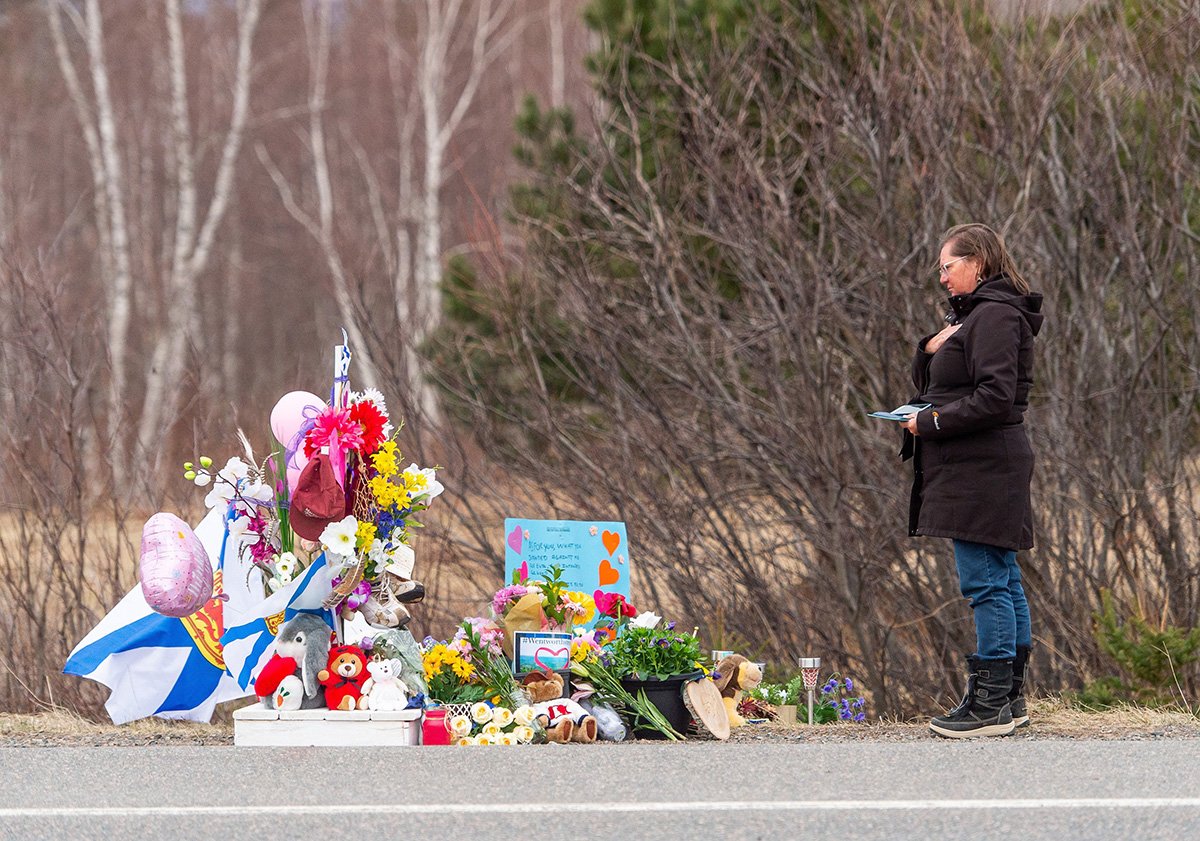The first thing I thought after hearing the news that a gunman had killed 22 people in rural Nova Scotia was: not again.
The largest mass shooting in Canadian history began with a man assaulting his ex-partner and handcuffing her to a chair, before she was able to escape and hide in the woods. She was able to tell the police he was dressed in a police uniform and driving a replica squad car.
That men have been killing women for millennia isn’t news. One of the more surprising aspects of the murders in Nova Scotia was that the gunman’s ex-girlfriend survived. Many other people did not.
A teacher, a woman walking her dog, a veteran RCMP officer, neighbours, friends and colleagues. Some people had a connection to the killer, others were just in the wrong place at the wrong time. Although details are still emerging about the timeline of the crime, one thing that is clear is that it began with violence against a woman.
This is something Nova Scotia has in common with many of Canada’s most horrific mass killings. The murder of 14 women at École Polytechnique de Montréal. The Danforth shooting in Toronto. The killing of nine at a Vernon wedding by an attendee’s estranged husband. The Toronto van attack where a self-described member of the incel community took his rage against women to the streets, killing 10. Add in the untold numbers of violent deaths of Indigenous women across the country and you have a veritable graveyard stretching from coast to coast.
The op-eds about the Nova Scotia killer’s motives are spilling out, with calls for greater awareness and understanding about the root cause of misogynistic violence. Many of these articles are exceptional and worth reading, including Suzanne Rent in the Halifax Examiner, Elizabeth Renzetti in the Globe and Mail and especially Pamela Palmater in Now Magazine, who takes apart an idiotic headline in the Globe about the shooter’s hobbies and passions that intimated he was a nice ordinary guy who just snapped, the additional implication being that someone must have driven him to this point of extremity.
The articles and essays will continue for a while and then trickle to a close, and then it will be silence until the next killing. It’s the silence that’s a bigger part of the problem, like the vast underbelly of a rotten iceberg, unseen and unfelt until it rips you open and sends you to the bottom of the sea to drown.
Writing about the events in Nova Scotia feels impossible. I started and stopped at least half a dozen times. What else is there left to say except “stop killing us.” But even if you state the obvious, you too can become a target.
After reading a lot about the killings I started to check out. Or maybe more accurately, shut down. Sometimes you simply can’t take in anymore. Or maybe you don’t want to think about it any longer. You start to go silent even inside your own head.
One of the first things that pulled me up from the seabed was Rebecca Solnit’s new essay collection, Recollections of My Nonexistence: A Memoir.

Solnit can be a curiously elliptical writer, but she has a singular ability to put into words ephemeral ideas and nascent foggy experiences that you understand in your gut but lack the language for. Reading her essays is akin to have someone focus a spyglass for you with an expert pair of hands, and suddenly a crystalline clarity clicks in with a rush. The experience can be almost dizzying.
In one of her most well-known essays, Men Explain Things to Me, Solnit writes: “Violence is one way to silence people, to deny their voice and their credibility, to assert your right to control over their right to exist. About three women a day are murdered by spouses or ex-spouses in this country. It’s one of the main causes of death in pregnant women in the U.S. At the heart of the struggle of feminism to give rape, date rape, marital rape, domestic violence, and workplace sexual harassment legal standing as crimes has been the necessity of making women credible and audible.”
As she explains in her memoir Recollections of My Nonexistence, one of the most important lines in the essay is this: “Credibility is a basic survival tool.” In order to survive, you must be both heard and believed.
Silence is where it often begins. With little things. Being ignored, disparaged, talked over and discredited, leading to bigger acts of obliteration.
Solnit makes it personal. Intimate even, using her own life and experiences to lend perspective. Many of the essays in Recollections of My Nonexistence document the strategies that women use to avoid being killed, raped and vanished. As a young woman Solnit mastered the art of becoming invisible, silent and unnoticed, able to pass by unseen and unremarked upon. But sometimes even that doesn’t work.
She sums up this foregone sense of doom.
“To be a young woman is to face your own annihilation in innumerable ways or to flee it or the knowledge of it, or all these things at once. ‘The death of a beautiful woman is, unquestionably, the most poetical topic in the world,’ said Edgar Allan Poe, who must not have imagined it from the perspective of women who prefer to live. I was trying not to be the subject of someone else’s poetry and not to get killed; I was trying to find a poetics of my own, with no maps, no guides, not much to go on. They might have been out there, but I hadn’t located them yet.”
Nonexistence begins with the writer as a young woman embarking on the process of finding her voice, in what Virginia Woolf once termed A Room of One’s Own. In Solnit’s case, it’s a studio apartment in a San Francisco neighbourhood. In lucid language, the place comes to 3D life: the bay windows, the stove, the closet that becomes a makeshift bedroom. But even in this place of refuge violence sneaks in as she writes about a writing desk given to her by a close friend. “A year or so before she gave me the desk, my friend was stabbed 15 times by an ex-boyfriend to punish her for leaving him.... Then she gave me a platform for my voice. Now I wonder if everything I have ever written is a counterweight to that attempt to reduce a young woman to nothing.”
To break the silence you need a voice, but you also need the confidence to make it heard. At the centre of many of the essays is the ongoing struggle to even recognize the actual truth of one’s own experience. In Men Explain Things Solnit recounts a story about a then-boyfriend’s uncle describing an incident of domestic violence, “how a neighbor’s wife in his suburban bomb-making community had come running out of her house naked in the middle of the night screaming that her husband was trying to kill her.”
The story is breezily offered, but when she asks how he knew this wasn’t actually happening, “He explained, patiently, that they were respectable middle-class people. Therefore, her-husband-trying-to-kill-her was simply not a credible explanation for her fleeing the house yelling that her husband was trying to kill her. That she was crazy, on the other hand... ”
The term gaslighting doesn’t quite do justice to the upside-down crazy-making sensation of having your experience of reality denied. It also helps explain the seismic reaction to Solnit’s work. The Men essay was like the shot heard round the world, with women sharing it feverishly and even helping coin the term “mansplaining” that made it into the Oxford English Dictionary.
In the work of making visible the vast, unspoken sea of violence perpetrated against women, Solnit has been joined by armies of writers, activists and ordinary women around the globe. The #MeToo movement, the protests rippling through Latin America, and the recent court cases against high-profile men like Harvey Weinstein have cracked open an ocean of pain, which continues to pour out in a biblical flood.
In a preface to Men Explain Things Solnit writes: “Having the right to show up and speak are basic to survival, to dignity, and to liberty. I’m grateful that, after an early life of being silenced, sometimes violently, I grew up to have a voice, circumstances that will always bind me to the rights of the voiceless.”
Sometimes the voiceless are also the dead.
One of the grimmest things I’ve read recently was an article in Harper’s Magazine about the rates of femicide in Mexico and the story of a 12-year old girl raped and murdered by three men in the village where she grew up. I felt a strange confusion long after reading it. A feeling of not understanding how a person could do what was done to this little girl. The mind staggers away from the full scope of this reality.
That misogyny is often the root cause of violence is clear, but the bigger question is why? Where does this hatred come from?
I read recently that although women also suffer from mental illness, 98 per cent of mass shootings are committed by men. Often the shootings begin with a pattern of domestic abuse starting in the most intimate place: the family. Suzanne Rent’s article in the Halifax Examiner quotes activists Nancy Ross and Cary Ryan who describe the phenomenon: “The problem of gender-based violence is often not discussed as much as it should be because it exists in silence, so people may not realize how big an issue it is. ‘It’s an under-reported, under-acknowledged, under-resourced, silenced issue,” Ross says. “It’s a community issue, it’s a social issue, it’s a family issue.’”
Breaking this silence can sometimes happen unexpectedly. I remember a conversation from a few years back. It was an ordinary workday and my team went to the cheap sushi place, ordering our usual bento box specials. I don’t remember how we got onto the subject, but suddenly we were talking about men doing terrible things to women, and the stories spilled out: teenage house parties, getting pushed into a room, no one around to help you. After lunch was over, we went back to work like nothing had happened. But something had. I remember feeling strangely shaken by the moment. I’d known these women for years and we’d never talked about any of these things before.
Even if it sometimes feels like there’s nothing you can say to fundamentally shift reality, you still need to keep saying it over and over again, especially if it feels repetitive, exhausting, demoralizing. In this the act of writing, of sharing stories, of telling the truth is cumulative, laid down in sedimentary layers over a lifetime. The process can feel interminable, but eventually it leads up from the bottom of the sea towards the light and the air. ![]()
Read more: Rights + Justice, Gender + Sexuality
















Tyee Commenting Guidelines
Comments that violate guidelines risk being deleted, and violations may result in a temporary or permanent user ban. Maintain the spirit of good conversation to stay in the discussion.
*Please note The Tyee is not a forum for spreading misinformation about COVID-19, denying its existence or minimizing its risk to public health.
Do:
Do not: